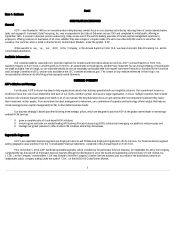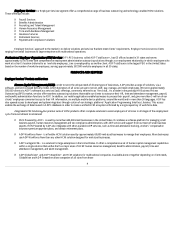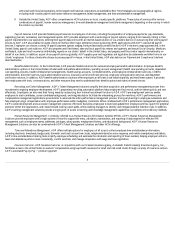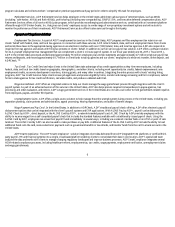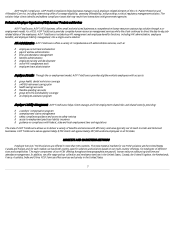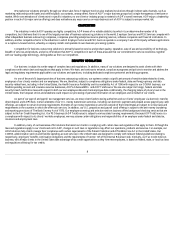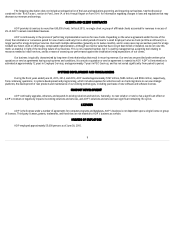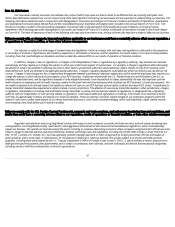ADP 2014 Annual Report Download - page 14
Download and view the complete annual report
Please find page 14 of the 2014 ADP annual report below. You can navigate through the pages in the report by either clicking on the pages listed below, or by using the keyword search tool below to find specific information within the annual report.
Change in our credit ratings could adversely impact our operations and lower our profitability
The major credit rating agencies periodically evaluate our creditworthiness and have given us very strong long-term debt and the highest commercial
paper ratings. Failure to maintain high credit ratings on long-term and short-term debt could increase our cost of borrowing, reduce our ability to obtain intra-day
borrowing required by our Employer Services business, and ultimately reduce our client interest revenue.
If the distribution of CDK common stock to ADP’s stockholders does not qualify as a tax-free spinoff, we could incur substantial liabilities and may not
be fully indemnified for such liabilities
Prior to completing the spinoff of CDK , A DP received an opinion from Paul, Weiss, Rifkind, Wharton & Garrison LLP, its counsel, to the effect that,
based on certain facts, assumptions, representations and undertakings set forth in the opinion, the distribution qualified as a transaction that is tax-free under
Section 355 and other related provisions of the Internal Revenue Code. ADP also received a private letter ruling from the IRS with respect to certain discrete and
significant issues arising in connection with the transactions effected in connection with the separation and distribution. The opinion and the ruling were based
upon various factual representations and assumptions, as well as certain undertakings made by ADP and CDK . If any of those factual representations or
assumptions was untrue or incomplete in any material respect, any undertaking is not complied with, or the facts upon which the opinion and the ruling were based
were materially different from the facts at the time of the distribution, the distribution may not qualify for tax-free treatment. Although a private letter ruling from
the IRS generally is binding on the IRS, the IRS did not rule that the distribution satisfies every requirement for a tax-free distribution. Opinions of counsel are not
binding on the IRS or the courts. As a result, the conclusions expressed in an opinion of counsel could be challenged by the IRS, and if the IRS prevails in such
challenge, the tax consequences to stockholders could be materially less favorable.
If the distribution were determined not to qualify as a tax-free transaction under Section 355 of the Code, each United States holder generally would be
treated as receiving a distribution taxable as a dividend in an amount equal to the fair market value of the shares of our common stock received by the holder. In
addition, ADP generally would recognize gain with respect to the distribution and certain related transactions, and CDK could be required to indemnify ADP for
any resulting taxes and related expenses, which could be material. The distribution and certain related transactions could be taxable to ADP if CDK or its
stockholders were to engage in certain transactions after the distribution. In such cases, ADP or its stockholders could incur significant U.S. federal income tax
liabilities, and CDK could be required to indemnify ADP for any resulting taxes and related expenses, which could be material. CDK may be unable to indemnify
us fully for any such taxes and related expenses.
We may be unable to attract and retain qualified personnel
Our ability to grow and provide our clients with competitive services is partially dependent on our ability to attract and retain highly motivated people with the
skills to serve our clients. Competition for skilled employees in the outsourcing and other markets in which we operate is intense and, if we are unable to attract
and retain highly skilled and motivated personnel, results of our operations may suffer.
Item 1B. Unresolved Staff Comments
None.
Item 2. Properties
ADP owns 11 of its processing/print centers, and 17 other operational offices, sales offices, and its corporate headquarters in Roseland, New Jersey,
which aggregate approximately 3,496,692 square feet. None of ADP's owned facilities is subject to any material encumbrances. ADP leases space for some of its
processing centers, other operational offices, and sales offices. All of these leases, which aggregate approximately 5,454,924 square feet in North America, Europe,
South America, Asia, Australia and Africa, expire at various times up to the year 2024. ADP believes its facilities are currently adequate for their intended
purposes and are adequately maintained .
Item 3. Legal Proceedings
In the normal course of business, ADP is subject to various claims and litigation. While the outcome of any litigation is inherently unpredictable, ADP believes that
it has valid defenses with respect to the legal matters pending against it and that the
13


